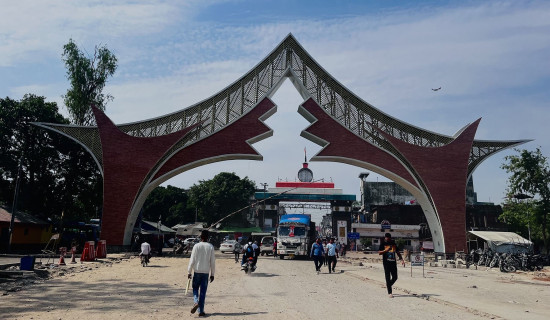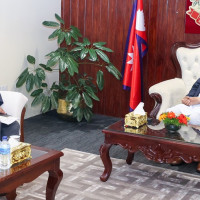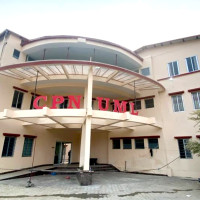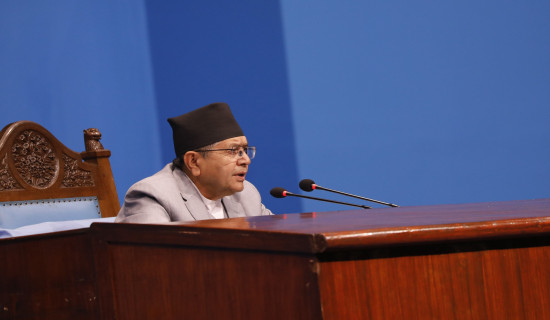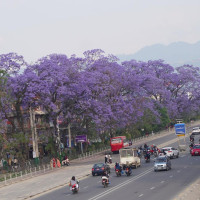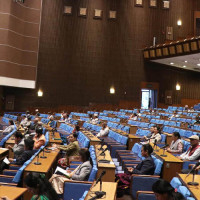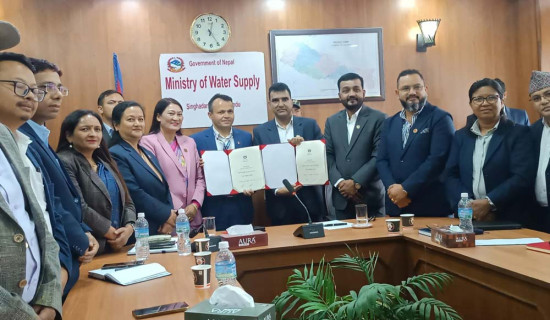- Friday, 9 May 2025
Demise Of Constitution's Architech
Life is not for eternity. Everyone has to embrace death as an inescapable eventuality. But death is not the same in significance for everybody. As China’s great leader Mao Zedong once said,'some deaths are lighter than a feather while others are weightier than a mountain’. Those who try to rise above narrow self-interest and dedicate their lives for the cause of the people and the nation occupy a huge space in public memory even after death. Subas Chandra Nembang, former Speaker of the Parliament and Chairperson of Constituent Assemblies, was one of such personalities whose death carried enormous significance, as was demonstrated by the presence of tens of thousands of people at the cremation site, the Aryaghat, last Thursday.
Coming from a nondescript village in Illam district in eastern Nepal, Subas Nembang rose to the staggering heights of political hierarchy and remained spotlessly clean in his conduct and social transactions, winning the hearts and minds of the people. Unlike many of his contemporary political doyens, he was not a generalist but an expert in his field. As a lawyer-turned-politician, he had the articles and clauses of the constitutional, civil, and criminal laws at his fingertips. It placed him in a vantage position to play a critical role at major junctures of Nepal’s transition, first from absolute monarchy to parliamentary democracy and again from parliamentary democracy to federal republican democracy.
He started his political career as a law student activist in the early 1970s. His father, Ram Bahadur Nembang, a district judge, had motivated young Subas to take up legal studies. Belonging to an affluent and elite family in Ilam, Subas Nembang had all he needed to maintain himself decently in Kathmandu when he was a student. But everything did not remain the same when one of his disgruntled domestic assistants, a sharpshooter named Chandraman Rai, alias Taswir, shot his father dead in 1970 while he was still in service.
Subas suddenly found his role reversed from a dependent, shy, and reticent law student to a breadwinner, guardian, and flicker of hope for his family. At the same time, he also started to develop a leftist worldview through interaction with union activists, primarily J.N. Khanal, who was his classmate and a political mentor. During those days, he was occasionally rounded up by the police and sent to detention centres for a short time because of his participation in student union activities, which were invariably associated with underground political parties and hence illegal. The Jhapa Movement was at its climax, and its leaders were being detained in all the major jails in the country. In one of these runs to detention centres, Subas Nembang received communist party membership from leftist leader Ghanendra Basnet at Central Jail in 1975 on behalf of the Central Jail Committee of the CPN (UML), then known as the Coordination Centre.
During the 1980s, Subas Nembang maintained a low political profile and led a professional life as a law teacher and a practicing lawyer. Subas, however, found himself in a new role when the 1990 People’s Movement overthrew the monarchy, paving the way for the restoration of parliamentary democracy in the country. In 1991, he was given a ticket by the CPN (UML) to contest the election in Constituency 2 of Illam and was elected. Since then, Subas has not had to look back. Ever since, he has contested all the national elections and come out victorious. In parliament, he found himself negotiating ways out of various complex situations. But the role he played in the capacity of speaker of the parliament stood out singularly throughout his political career. Many admit that Nembang was able to raise the norms and practices of parliamentary debates and discourses to an altogether new level.
Late Nembang had the distinction of becoming chairperson of two consecutive constituent assemblies, where he proved his mettle by successfully coordinating many competitive and even contradictory views vying for incorporation in the constitution. He maintained patience and relentlessly persuaded all the conflicting players to find common ground, even when the first Constituent Assembly was dissolved without promulgating a new constitution and the second one, too, was teetering on the brink of failure.
During the constitution-making process, Nembang had to negotiate with a myriad of conflicting aspirations, parochialism, and perspectives on identity politics to build the minimum consensus that was required to accomplish the drafting of the fundamental law of the land. Some critics accuse Nembang of inserting a secular agenda by trampling underfoot the aspirations of the majority Hindu population of the country. Similarly, the protagonists of identity politics accuse him of brutally crushing their dream of incorporating ethnicity-based federalism into the constitution. Despite the demeaning remarks against him, anyone closely observing the constitution-making process in Nepal will not fail to notice that Nembang’s role in the process was only that of a detached arbiter who tweaked the course of debates with classical expertise if they lost direction or ran the risk of becoming irreconcilably polemical.
In reality, the major political parties had accepted secularism to avoid walking into the quagmire of religious fundamentalism, which was likely if the concept of Hindu statehood was enshrined in the constitution. As for federal republicanism, the Nepali Congress and the CPN (UML) had accepted it as a better bargain to prevent the fragmentation of Nepal into a dreary landscape dotted with fortresses of religious zealots and ethnic warlords.
As the Chairperson of two consecutive constituent assemblies, Nembang played an effective coordinating role by framing debates within logical contexts, exercising authority through authentic citation, and providing a cogent interpretation of knotty issues. Nembang never stoked controversial issues, nor did he ever evince any insidious motive to reap benefits from the chaos of transition.
With his untimely death recently, a great constitutional authority in the country has departed from the central stage of constitutional politics, but his words and actions will continue to reverberate in the echo chamber of constitutional politics in Nepal for a long time to come.
( The author is the former ambssador of Nepal to Qatar, former associate proffessor of History at the Central Department of Tribhuvan University and former chairperson of Gorkhapatra Corporation.)



